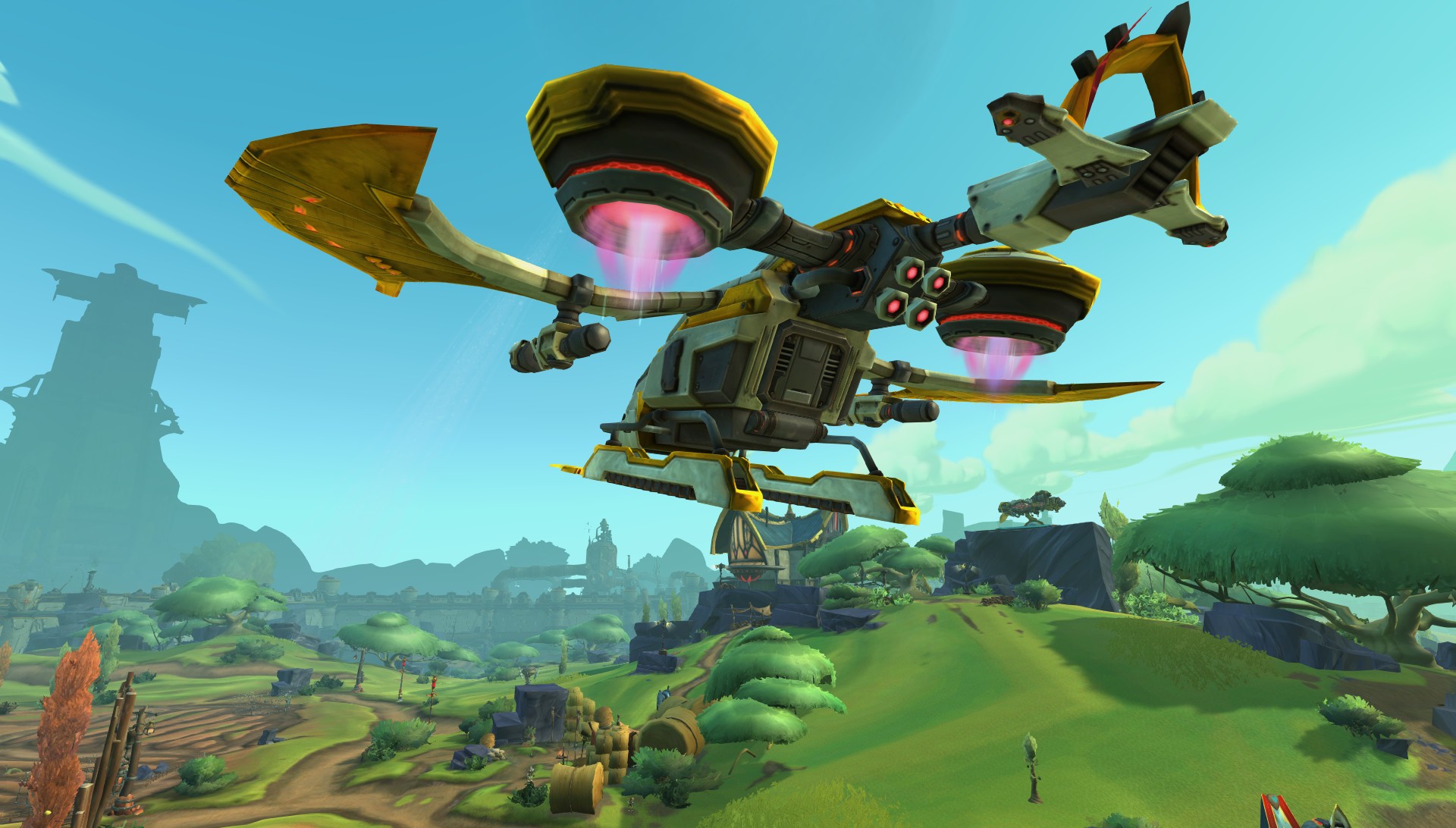Our Verdict
Clever questing and a stand-out combat system make for an entertaining MMO that's as large as it is full of character.
PC Gamer's got your back
In the nine years since World of Warcraft's release, plenty of other MMORPGs have tried to capture Blizzard's magic. The problem, for many, was a fundamental misunderstanding of what that magic was. Rather than start with an earnest wish to give people expansive, varied worlds, deep systems and engaging lore, they were instead conceived with the realisation that having millions of regular subscribers would look good on an annual earnings report.
I don't know the circumstances that led to Wildstar's creation, but, having played it for more than 50 hours, what impresses me is that it feels less cynical in its approach and less insecure about its inspirations. The World of Warcraft DNA is unmistakably present—you can see it in the questing, the structure, and, more than anything, the chunky, expressive cartoon style. But from that, Carbine have built, tweaked and created something distinct. Wildstar's biggest lesson is that you don't have to fundamentally revolutionise the genre to make a great MMO. You can instead use what's come before and, through a systematic and rigorous examination of every system, make it better.
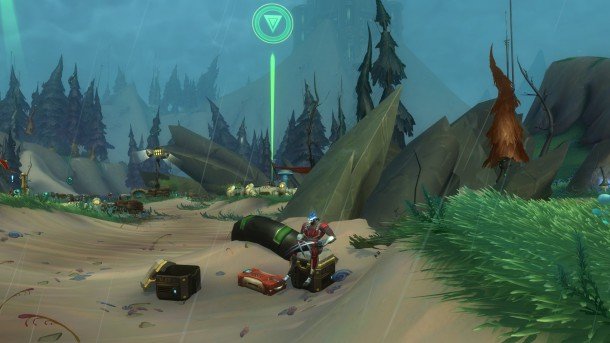
At the beginning of the game you pick from one of two factions. The Exiles are a rag-tag bunch of space refugees, who have arrived on Wildstar's planet of Nexus in order to make a new home. The Dominion—the guys who exiled The Exiles—are an intergalactic empire that have travelled to Nexus to unearth the technology of an ancient, powerful and mysteriously vanished race. Neither side is particularly fond of the other.
Your character is hand-picked—actually, let's not kid ourselves, every character is hand-picked to represent their chosen faction in the impending Exile vs. Dominion ruckus. While the opening story suggests a coherent narrative, once you're free of the tutorial, the plot takes a backseat to a series of episodes centred around the many outposts you'll find in each zone. Your character acts as an all purpose solution to your faction's many problems—like Harvey Keitel in Pulp Fiction, if he had bunny ears or was a robot.
Each quest is categorised by its impact on the story at large, with World, Zone and Region types in descending order of importance. At times, it can feel like you're being bogged down in the inconsequential, as another camp requests you clear another area of its troublesome inhabitants. But there's variety and humour sprinkled throughout, and it's easier to forgive Wildstar its blander episodes when you're embroiled in, say, the administrative bickerings of a corporate race of green clones.
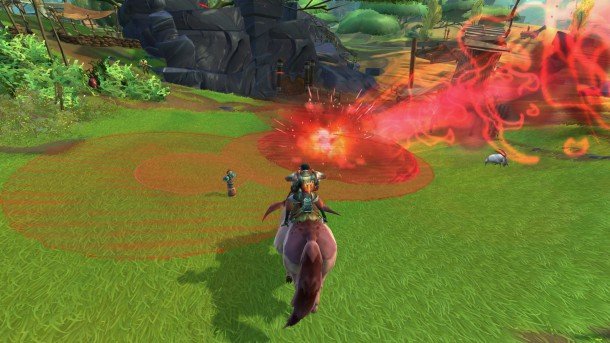
Questing, similarly, has its stand out moments amid a basic set of objectives. You're going to be killing a lot of things, and, when you're not, you're probably going to be activating or collecting a set number of objects by running up to them and pressing F. But then there are the moments when the game's penchant for silliness kicks in, and you're chasing a naked rabbit around a town, attaching a rocket pack to a cute, cuboid pig-thing, or hunting down erotic fiction in a spider-filled woodland.
Such highlights would be useless if the general questing was an enthusiasm-sapping churn of endurance. It's not; in fact its here that Wildstar starts to stand out for more than just its tone. While many of the quests ask you to kill a particular category of enemy or monster, they don't ask for a set amount. Instead, a percentage bar increases as you carry out your task. Kill smaller enemies, and it builds slowly. Attempt the larger, tougher variants, and you'll get a more significant boost towards your goal. For the biggest reward, there are Prime monsters, denoted by their menacing red sheen. These are much tougher, come with a base resistance to stuns and interrupts, and should generally be tackled by more than one person. As other players in the same area are likely doing the same tasks, I found that, after a brief dance of hesitation, most could be coaxed into action.
Whatever you take on, kill streaks are rewarded by an announcer, who enthusiastically informs you of a double, triple, super-kill or more. It's all part of Wildstar's brilliant sense of feedback, which harnesses a refusal to take itself too seriously as a way to reward your achievements. Even the "level Up" text is loud and bombastic, and accompanied by a similarly exaggerated voice-over.
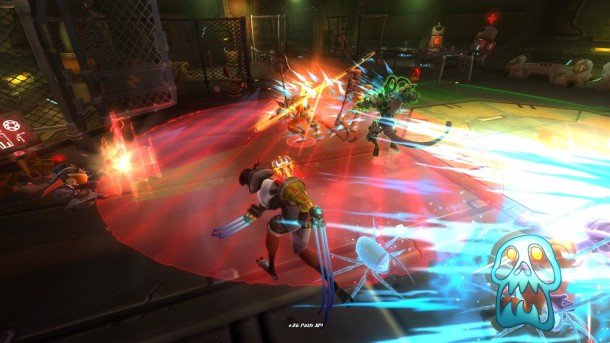
If quests can lack diversity, the same can't be said for the number of distractions that you'll find as you journey through a zone. Every player selects a Path, and these provide a secondary set of objectives throughout each area. Scientists scan the plants and wildlife of the world, Settlers build stations that give a temporary buff to players, Soldiers are offered a variety of special combat scenarios, and Explorers chart each zone, uncovering secrets and jumping on things. I picked the latter, and was given plenty of opportunities to suspend my to-do list in favour of climbing mountains or scavenging for secrets.
Kill something and you might activate a challenge—a timed objective to dispatch as many of that specific enemy as possible. Find a public notice board, and you'll be offered a group quest to take down an especially tough beast. Or, you might stumble upon a public event, in which players from around the area are called to work towards some large-scale attack. There are plenty of reasons to veer away from your given path.
In addition to that, special activities are unlocked at various stages across the levelling process. Shiphand Missions take you on a trope-filled sci-fi adventure that scales based on the number of players in your party. Adventures are five-player branching stories that re-purpose existing zones for specific, varied quest chains. And then there are dungeons, which provide some of the most difficult and tactical pre-endgame encounters.
These instanced quests help alleviate the issue of open-world grouping. There's no level scaling in Wildstar's open zones, which means it can be incredibly difficult to meaningfully travel with friends. Even during launch—with guild-mates of a similar level—finding moments when our quest-logs aligned was rare.
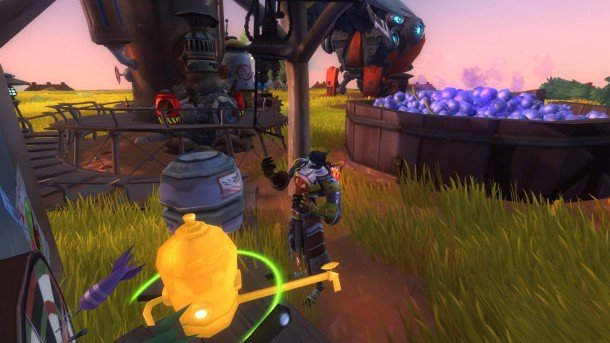
All of which means that now, as I approach level 25, I've got a variety of potential options available every time I log in. And, because each activity requires a different amount of time and effort, I've almost always achieved something when I log out. That could mean completing any of the above activities, winning a PvP match or progressing along the crafting tech tree. Alternatively, I might find a new table for my house—a terrifyingly compelling Animal Crossing-like patch of land, upgradable with mini-games, resource nodes and resting XP buffs.
If the basic structure of questing helps keep moment-to-moment play interesting, the biggest factor in keeping me actively engaged is the combat. It's hotbar driven, but is nonetheless lively and fluid. In that respect it feels closest to Guild Wars 2, with the same importance lent to evasion of attacks and positioning. The difference is there's no tab-targeting, meaning every skill needs to be manually aimed. Hold down a number key, and the range of your attack will be shown in blue. Let go, and you'll activate that ability, damaging everything in the highlighted area.
Enemies follow the same rules for anything above their most basic attack. Not only are you required to land your own abilities, but also dodge the red zones that telegraph theirs. In general play, this means even basic monsters can offer an entertaining fight, but it's while grouping that the system really comes alive. In PvP Battlegrounds—Wildstar's 10v10 objective-based matches—the floor becomes a constantly shifting patchwork of blue, red and the regenerating green of your healers.
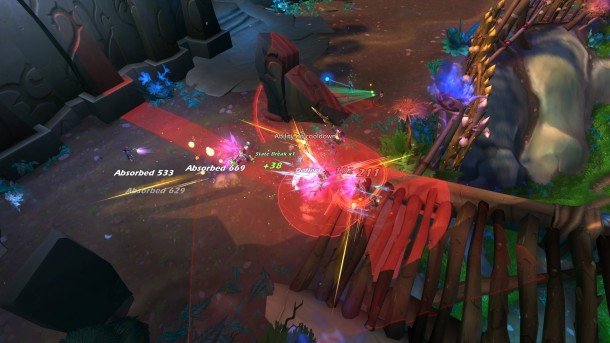
Because of the system, boss encounters can contain some thrilling moments. During one dungeon fight, my party was assaulted by multiple lanes of spinning blades, requiring us to quickly weave side-to-side. Earlier, we had to co-ordinate to take out a single bomb-bot in a field of many. Failure—as we learned on a previous attempt—meant being caught in an unavoidable and deadly explosion. Wildstar has no qualms about being difficult when it's appropriate, but—once you learn to parse the initially overwhelming display of multiple targets—you develop an intuitive feel for the action.
There's also great scope for tailoring and perfecting your loadout. As you level, you unlock up to eight ability slots, filled from a much larger pool of class-specific options. Through the abilities selected, and AMPs—passive stat boosts earned as you level—equipped, each class can effectively function as two of the three 'trinity' roles of tank, healer and DPS. Even within these roles, there's plenty room to manoeuvre. Having created a melee-based DPS character, I decided to expand my options with a ranged blade attack. It paid off beautifully when, in a PvP match, I was able to catch the finishing blow on a fleeing opponent who thought they'd escaped my otherwise limited range.
Carbine have created a brilliant foundation for a successful MMO, but there's still a lot riding on the days and months to come. Wildstar has a subscription, and also a system called CREDD. This, like EVE Online's PLEX, is game time bought with real-world money that can be traded to other players for in-game gold. As of writing, the system isn't active, which makes it impossible to predict if it will prove a reasonable alternative to a monthly fee. Either way, given the number of alternative funding models adopted by the genre, the cost of maintaining an MMO no longer validates its compulsory charge.
If Wildstar is to be worthwhile in the long-term, its developers will need to keep it regularly updated with meaningful content. For now, it's a successful love-letter to MMO fans, with more than enough to justify its initial cost.
Clever questing and a stand-out combat system make for an entertaining MMO that's as large as it is full of character.

Phil has been writing for PC Gamer for nearly a decade, starting out as a freelance writer covering everything from free games to MMOs. He eventually joined full-time as a news writer, before moving to the magazine to review immersive sims, RPGs and Hitman games. Now he leads PC Gamer's UK team, but still sometimes finds the time to write about his ongoing obsessions with Destiny 2, GTA Online and Apex Legends. When he's not levelling up battle passes, he's checking out the latest tactics game or dipping back into Guild Wars 2. He's largely responsible for the whole Tub Geralt thing, but still isn't sorry.
